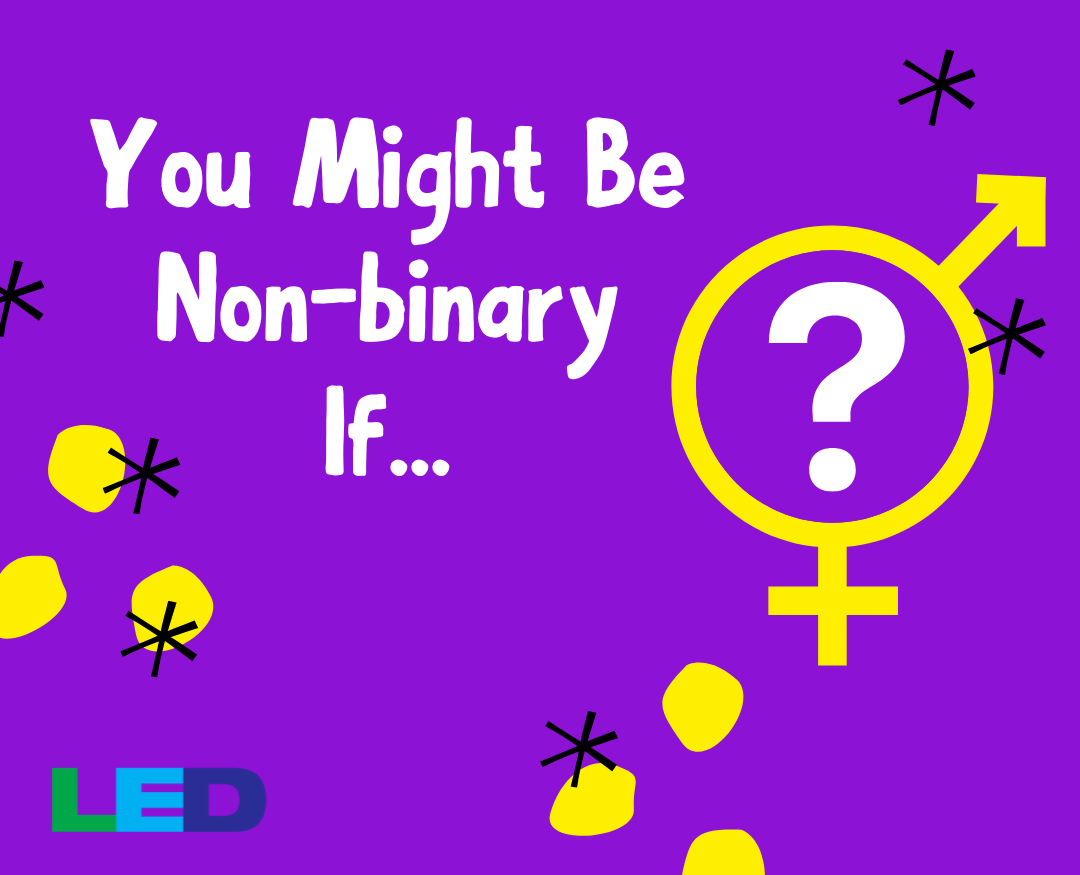
You Might Be Non-Binary If…
Like many, months of COVID isolation in 2020 sparked a journey of gender discoveries. My gender identity grew muddled and unclear, I lack confidence calling myself cisgender, I loved exploring new gender expressions, and that curiosity led to where I am now: a non-binary person in my mid-20s.
For transparency and for others wondering if they could be non-binary, I am an out lesbian assigned female at birth (AFAB).
How Gender Identity Became Unclear
I became conscious of my own gender identity at the start of COVID scares (April 2020 for me). I bought a set of small dumbbells and started regularly working out as one of my many quarantine activities. I stopped shaving my legs out of laziness and lack of contact with the world. By summer, I broke into a stash of boys’ sleeveless shirts that I salvaged from the donation pile years ago. For the first time, I fell in love with my body.
I kept making guesses at what else could make me feel this newfound sense of love. Boxer brief underwear? Yep. Sports-bra swim top paired with swim trunks? Yep. Cutting my hair? Yep. I chased this gender euphoria for months and talked myself down from any larger implications. I just felt good about my body.
You might be non-binary if…
- You avoid exploring gender because you’re afraid you’ll like it.
- You adopt more of an androgynous style/appearance and really love the way you look and feel.
Is my Body “Non-binary Enough”?
A non-binary body might be curvy, might be muscular, might have a full bust, might have a square jaw. The attributions are extremely varied, just as they are for men and women. And that is exactly where my confusion originated. All genders have varied body types. So why did loving my masculine features trigger such deep questions about my gender?
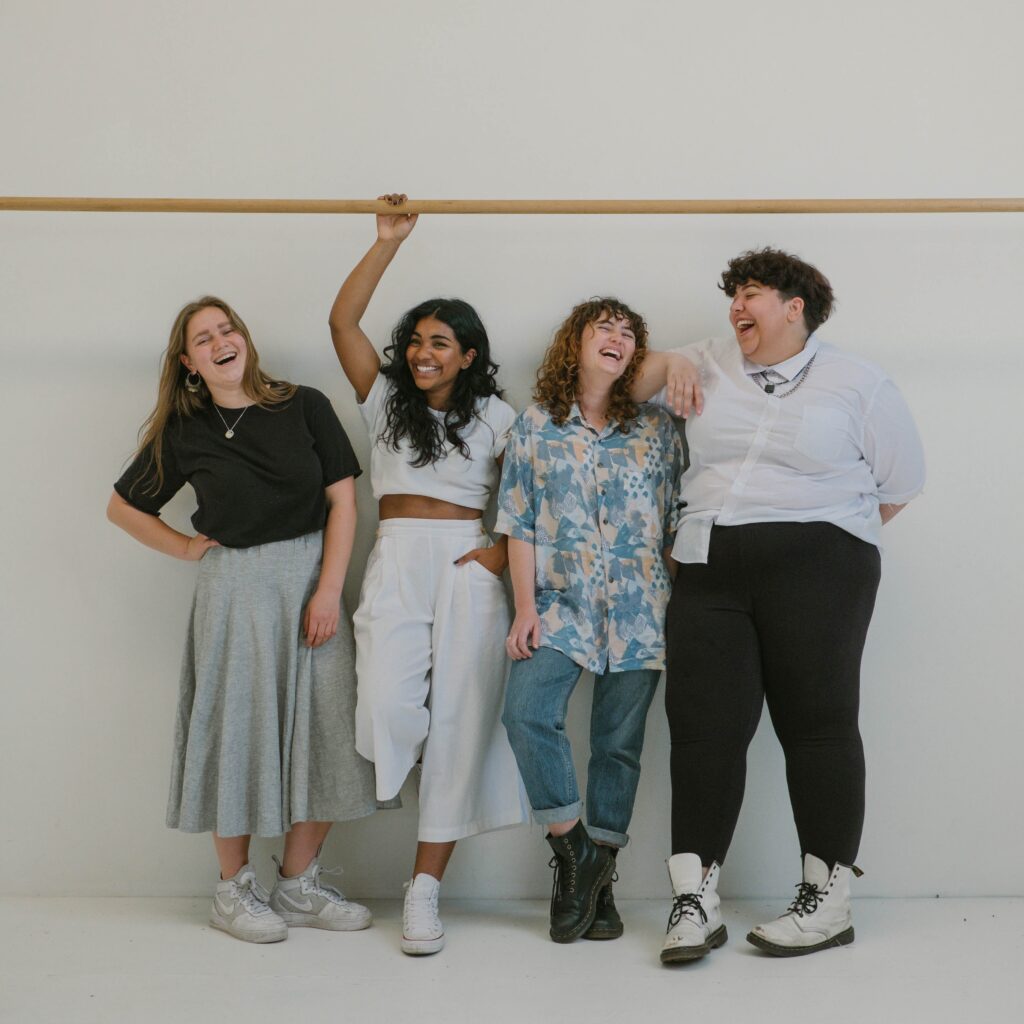
My body never really fit in once puberty hit. My (female) friends had boobs, got their periods, started growing into curvy bodies. My body remained shapeless, flat-chested, and period-free. But I had lots of body hair.
My body changed so differently than my friends’ did, and I was embarrassed. By the sixth grade, all of the girls sported bras that they’d show off to each other in the gym locker room; whereas I’d been so completely flat-chested that I hadn’t even thought about needing a bra at all until I was the only girl in class who changed into her gym clothes completely topless.
I had so much leg hair with no intention of shaving it that I refused to wear shorts to school—even in gym class—too embarrassed to expose the leg hair, too annoyed to shave it. And with no periods all through middle school, I’d felt so disconnected from womanhood that I genuinely felt like I was going through a boy’s puberty for that unforgivable, 3-year stretch of hell.
In high school, I got my period, filled an A-cup bra, and succumbed to shaving my legs. Yet, the flat chest and hairy body routinely displaced my connection to womanhood, especially when classmates made any comments on the matter. I had to tell myself that my body’s “masculinity” was still beautiful, and that didn’t make me any less of a woman. I spent my whole life convincing myself of that. I’m still a girl. While the affirmation comforted me during an outcasted adolescence, it backfired into my adulthood when I started questioning whether or not I really was a woman.
You might be non-binary if…
- You’re confused and/or weary about how your body might fit into the non-binary identity.
- Your physical connection to womanhood feels strained or awkward.
Gender Dysphoria for Non-binary Folks
By now, I’ve long since understood that no two experiences are identical, but that didn’t stop me from comparing my feelings about gender to trans and non-binary people around me. I used their experiences to gauge whether or not I was cis. This wasn’t always a good way to go and could even (unintentionally) invalidate my own identity at times, but it was necessary work.
Chest dysphoria
Most people associate trans/non-binary AFAB people with chest dysphoria. (People assigned female at birth with discomfort about their breasts.) So, this is where I started assessing whether I was “really” non-binary.
The only problem was, I never thought much about my chest. I’ve opted out of wearing bras for almost the entirety of 2020. Before that, I’ve worn nothing but sports bras with little to no padding for several years. I couldn’t tell you the last time I wore a real bra with a real size measurement that wasn’t just marked as XS.
In my teen years, I’d been taught to hate my boobs. They didn’t fit in. And I really did hate that. But I spent four years at university, felt solid in my lesbian identity, got into a relationship, and stopped caring about it altogether. Because of that, I had a hard time relating to the non-binary people around me. Most of those I talked to did have chest dysphoria; I had chest indifference. Maybe I’m just a woman.
Eventually, over the course of months, I hit four key moments that helped me understand how I felt about my own chest. First, a non-binary influencer with a similar body type to mine explained their relationship with their chest as less strained than other trans AFAB people, saying they would probably enjoy their body without breasts, but having top surgery wasn’t something they needed to have. I thought maybe my chest feelings ran parallel to this.
Second, this realization summoned a memory of a comment I had while watching TV years ago. As a fan of The Fosters, I recalled one of the lesbian moms, Stef, found pre-cancerous cells in her breast tissue, and that removing her breasts as a preventative procedure would remove the risk of breast cancer. And I remember thinking, Wow, that’s convenient. Obviously a horrible thought to have, considering breast cancer is a very big and real deal, definitely not a cis thought to have.
Third, a trans man I’m friends with told me that he had a weird delay in chest dysphoria due to small size. If he wore a large shirt, he didn’t have to think about it. I have a dresser and closet filled with over sized shirts.
Lastly, and most obviously, I tried binding three years ago. I watched YouTube videos on how to bind my chest, ordered binding tape samples, and tried it out. The tape didn’t work so great, so the other samples spent three years in my sock drawer, but in retrospect I feel like the strength of binding curiosity should’ve been a clue back then. My mind framed this curiosity as just that: curiosity. But binding is just not something cis people are that curious about. And even through months of questioning my gender—obviously knowing I tried binding before—I still felt like my experienced chest dysphoria wasn’t “enough” to make me non-binary.
So, let’s get something straight: dysphoria is just discomfort. And—like most things—exists on a scale. There’s no threshold of discomfort to reach in order to be trans or non-binary.
You might be non-binary if…
- You feel indifferent about your chest.
- You started referring to your boobs as your chest.
- You briefly wished you had precancerous cells in your breast so you could have a “good” reason to get them removed.
- You wouldn’t care if your boobs vanished.
- You want to try binding out of “curiosity” or “because it looks cool.”
Dysphoria with name and pronouns
Some trans and nonbinary people might experience dysphoria with their assigned name and pronouns. But like with chest dysphoria, my experienced dysphoria here wasn’t as simple as “yes this makes me dysphoric” or “no this doesn’t make me dysphoric.”
My name is Jess. It’s not a very gendered name. Neither is the nickname friends and family sometimes use instead: Jesse. In fact, you might recognize that the spelling of Jesse uses the “masculine” spelling (rather than the feminine version, Jessie). I randomly insisted and corrected the spelling of my nickname from the age of four years old when I first started pre-school and switched between Crayola handwriting attempts of Jesse and Jessica on all my papers.
My given name is Jessica, though even in childhood people rarely used it. In third grade, I had class with another Jessica M. So, we could not distinguish between Jessicas since we were both Jessica M. I offered to go by Jesse instead. My teacher and all my peers adopted the nickname my family used at home.
When I started university, I introduced myself as Jesse or Jess to new classmates and coworkers and used either of name during icebreakers. I rarely had to think about the name I was given. But when I did, I wasn’t a fan. Eventually, it stopped feeling like me. After dating my girlfriend for a short time, I knew I wanted to change my name when we got married to just Jesse or Jess.
When I began exploring pronouns, I asked my girlfriend and close friends to use they/them for a while so I can see how it feels, and I’m not sure I have the answer yet. When I first saw or heard friends use they/them pronouns for me, it wasn’t a huge rush of relief, but also didn’t feel unnatural either. Part of me had been really scared of trying the pronouns, because honestly, I don’t want to like they/them pronouns too much. I don’t want to let myself feel so comforted by those pronouns that she/her feels painful.
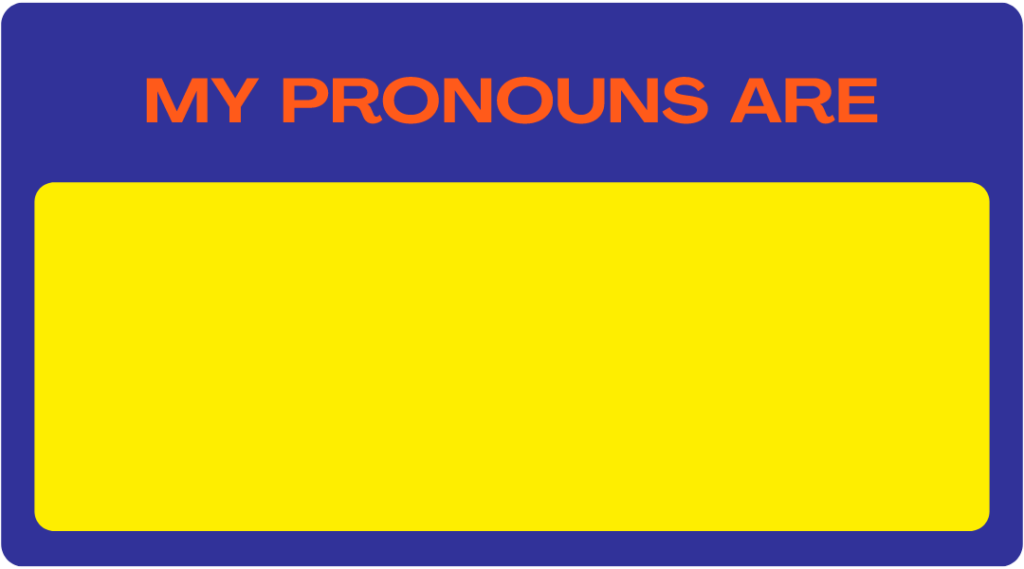
I imagine what adopting they/them exclusively might look like, and it’s scary. If I learn that she/her becomes so uncomfortable, then I have to out myself to everyone in my life, and I just don’t know if that’s what I want. Even for people who understand the concept of nonbinary, it’s a lot to take in. It’s a lot for me to give away. I’m afraid that people will think being non-binary and needing they/them pronouns means I want to make a spectacle of myself, or that I’m confused. And I am confused, which is the worst part. It’s hard to describe to someone why non-binary makes all the sense in the world to me when I still spend some days wondering if this is all just in my head.
You might be non-binary if…
- You have a weird relationship with your given name.
- You stopped using your given name.
- You are considering using different pronouns.
- You’re considering changing your name because you feel disconnected from it, even if this name change is at the convenience of marriage.
Non-binary gender euphoria
Gender euphoria is the opposite of gender dysphoria. My experienced gender euphoria happened naturally by just letting myself explore new styles and embrace my body in a new way. It guided my entire journey with gender. And honestly, I didn’t think I experienced dysphoria at all until experiencing my many euphorias.
Euphoria one—muscle gains! Working out had me feeling so good about the way I looked. I kept progress on arm muscle growth with frequent flexing selfies in the boxers I wore as PJs paired with cutoff sleeveless tops. Euphoria. I couldn’t stop taking pictures like this. My girlfriend said the flux of this exact selfie type made it so that she wasn’t surprised when I told her I’ve been questioning my gender.
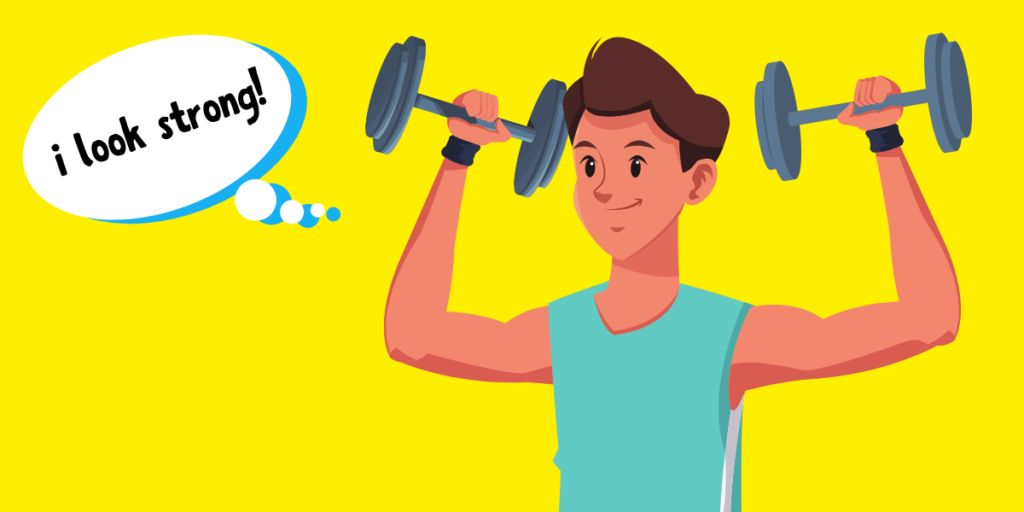
Euphoria two—embracing the body hair! I stopped shaving my legs and it felt great. I had a conversation about my leg hair with my brother, fearing I “should” shave my legs because I was getting worried people would start staring. He said, “who cares,” which was affirming.
I also used to shave my toes/feet because I have the feet of a hobbit. Plus, I often found myself avoiding crop tops because of body hair on my back and happy trail. But since settling into my newfound non-binary identity, I’ve found so much comfort in wearing sandals (something I always avoided due to hobbit feet) and crop tops have become a wardrobe staple. The body hair just became an integrated part of a validating gender experience.
Euphoria three—haircut! After years of contemplation, I finally chopped my long hair into a bob. Easier to hide when I want to, it’s helped me feel a lot more valid in my identity and feel more myself.
Euphoria four—binding! My trans friend sent a binder he no longer needed, and I loved the way it made me look and feel. I was surprised to find the difference it made in some of my favorite shirts and at how much I genuinely loved the way I looked wearing it. I couldn’t get over it. I tried it on with just about every shirt I own because I simply couldn’t believe it.
You might be non-binary if…
- You discover a newfound love for your body.
- Your journey is guided by self-love, not self-hate. (Not every gender journey is mobilized by dysphoria.)
- You face the intense desire to cut your hair.
Coming out as non-binary
Over the last several months, I’ve come out to my girlfriend, several of my friends, and my sister. I’ve had the great fortune of surrounding myself with all the right people in my early adult life so far, and letting so many of my friends become part of this journey with me has minimized the stress I anticipated from all this. Here’s the summary of all the coming-out exchanges.
Coming out as non-binary to my girlfriend
The backseat thoughts of gender and weary possibilities of non-binary failed to dissolve as I imagined (or hoped) they would. I had to tell my girlfriend.
I have to tell you something important, but it’s not that serious so you don’t need to be worried, I told her. I’ve been thinking a lot about my gender lately. I confessed to being confused and about letting a newfound self-love and appreciation for my body navigate my feelings and connection to gender.
I think I knew what this would be about, she admitted after assuring me that wherever this journey ended, I had her support. I could barely even use the word non-binary in our conversation. I certainly didn’t use it for myself. But I knew, even then, that months of circular thoughts don’t end at the start of a journey. I’ve done identity before. Although this felt different, it had this nagging, unspoken familiarity. A path I couldn’t clearly see but also couldn’t turn away from.
So, months later, after several conversations, I came out as non-binary to her. She obviously knew that was coming. We both did. She said, “I’m proud of you but we been knew.”
Coming out as “confused” and “I think I’m non-binary” to my sister
My sister is the best ally I could ask for. When I came out as bisexual, she supported me and told me to just keep her updated on my journey, at her young age of 15 from our confederate-flag-flying hometown, and also confessed that she wasn’t very surprised. When I came out as a lesbian, she helped me make that transition too.
I joked about “coming out again” and shared some of my gender thoughts. She responded nearly the same as the first coming out. With support and a “I’m not too surprised” comment. About a month later, I told her I was “pretty sure I’m non-binary” and that the feelings haven’t gone away. She thanked me for the update and asked if there were anything she could do to help me along.
Coming out to my IRL friends as “confused” and “I am…[refuses to say the word out loud]”
I told my two closest friends that I’d been feeling confused about my gender for months, and both met me with such unconditional support that it empowered me. One managed to wade through texts of a near 1k-length featuring confused ramblings and half-thoughts, and came out declaring, “I’ll be using they/them pronouns for you, let me know if that changes!” and then offered resources and reassurance.
Another friend asked how the gender journey was going on a few of our scheduled phone calls. The most recent left me euphoric. How are you feeling about it now? She asked. I followed with inhuman sounds, thoughts that crashed into each other and derailed themselves, strings of run-ons and no inhales. I knew, but I couldn’t get the words out, and it showed. I just couldn’t say the word. But she knew what it meant. “Even though you’re still stressed about this,” she said, “you seem a lot more sure now.” I exhaled.
The non-binary coming-outs to come
Like coming out as bi or lesbian, the hardest part for me is the fear of changing how someone perceives me. What will they think of me now? Some words come to mind. Confused, attention-seeking, etc.
But the experiences so far have been overwhelmingly supportive. I always knew my girlfriend would respond well, and knowing how reassuring and open she is about all things helped me share this with her early in the process. Soon after questioning it myself, I was able to bring it to her right away, which is something I’ve never been able to do before. This was actually the first internal crisis I’ve ever had where I turned to a person before turning to a pen and paper first.
You might be non-binary if…
- You feel the need to tell someone close to you that you’re confused about your gender.
- You hope your thoughts about gender go away.
- You’re scared to consider that you might be non-binary.
- You have a hard time putting your thoughts about gender into words for someone else.
- You’re scared of changing the way someone thinks about you because of your gender.
Talking to cis women about my gender confusion
Surprisingly, I found detailing my gender experience to cis women as the most validating part of the journey. Especially with cisgender lesbians. Many lesbians experience a strained or unusual relationship with womanhood anyway, so I attributed my confusion early on as just a gender side-effect to lesbianism. But talking to cis lesbians, like my girlfriend and especially cis lesbians who weren’t very femme themselves but still comfortable and confident in their cis identity—that was the real eye-opener.
One friend told me that she was mistaken for a boy once by a stranger—a catalyst for immediate offense. Oh, I wouldn’t be offended if someone thought I was a boy, I realized. I think I’d be pretty pleased with myself. The conscious thought about gender perception from strangers brought forth another reality of my past: I spent much of the winter tucking my long hair into a wooly hat in attempt to make my gender less obvious. Without ever thinking about those implications. Once again, in retrospect, that’s not a very cisgender thing to do. I just liked the thought of strangers at the grocery store not being able to tell what my gender was. And pretended everyone did that.
I also told the same friend about my realization about The Fosters’ pre-cancerous cells storyline. She said, “actually getting rid of your boobs would be like…really hard for a woman.” Huh, who’d’ve thought? Several of these moments continued to happen. I’d describe something about my experience and XYZ cis lesbians would say, “I’ve never felt like that.” Very validating stuff. Maybe I really wasn’t a woman.
You might be non-binary if…
- You keep remembering things about your past that you thought everyone experienced but they actually did not.
- You keep wondering “is this a thing cisgender people do”?
- Cis lesbians have very different experiences of womanhood than you do. For example, cis lesbians feel comfortable in their woman identity and you do not.
But what if I’m not non-binary and I’m actually a binary trans man?
This thought crossed my mind a few times and I recoiled. I played the bisexual to lesbian stereotype, and saw a few trans men start their journeys as non-binary people. What if that happens to me? I brought the concerns up to my girlfriend (a lesbian), who had similar concerns, naturally.
I shared the same thoughts to a friend very early on in the journey, who’d suggested I detail my feelings and fears on reddit and see what other trans men and non-binary people had to say/how their experiences aligned or diverged from mine. This was extremely helpful. Most of the people who replied said it’s something I have to figure out for myself, which was frustrating. I wanted answers now. Something a few said to try was to actually be a man for a few days. Use he/him pronouns, dress in men’s clothing, in every way possible, just live as a man for several days and assess how I feel.
I didn’t take their advice (yes, I dish it but don’t take it, anyway); I thought it might be helpful to share here in case someone reading this actually listens to advice. Truthfully, living as a man didn’t sound fun. And when I talked about it with my girlfriend and friend early in the journey, they both asked how I would feel if I was a trans man. Idk, I said. Idk there’s some things that I do like about being a woman. I like being a sister. I like being a part of collective women empowerment. I don’t know.
Something about imagining being a man felt not-right. But it really came down to accepting that even if this is the end point of the journey, it’s not who I am right now. The more I allow myself to explore and understand my gender, the more this question will dissolve, as it’s already begun doing so over the last several months.
You might be non-binary if…
- You feel disconnected from womanhood but still enjoy some aspects of womanhood.
- You find it hard to understand your gender because neither woman nor man feels particularly right or wrong for you.
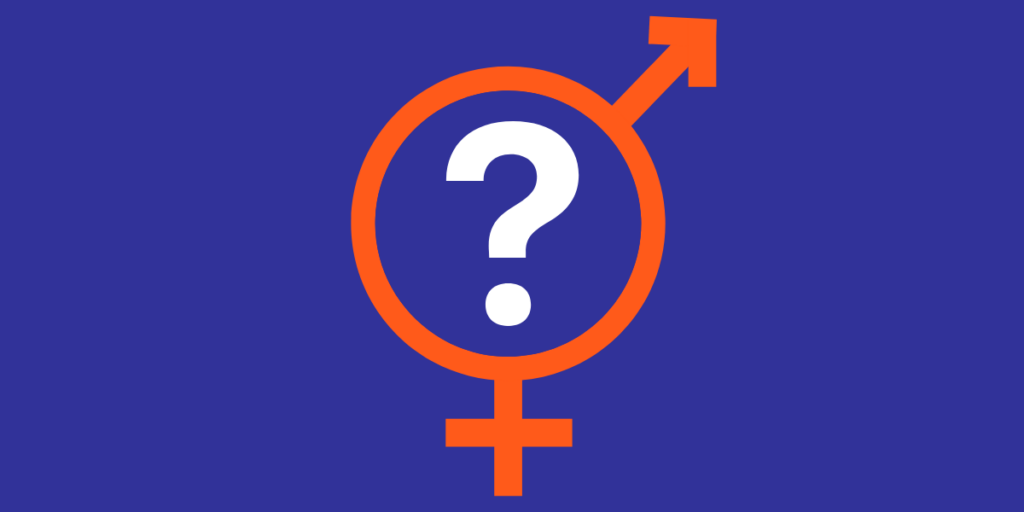
But what if I’m not non-binary and I’m actually a woman?
I hope one day I will stop questioning the validity of my identity. Today isn’t that day. I’m sure tomorrow won’t be that day either. It’s the single biggest factor that restrained this journey for so long and forced actions and thoughts of gender years back deep into the subconscious, only resurfaced and explored years later.
I’m afraid that I’m just re-learning what it means to be a woman, I’d said to just about everyone I talked to about gender at all. Embracing the masculinity of my body could’ve been a liberating moment for any woman with my body type. But I’m just not a woman.
You might be a cis woman if…
- You’ve never thought about binding your chest.
- You’ve never watched tutorials about how to bind your chest.
- You’ve always referred to your chest as your boobs.
- You think preventative mastectomies are definitely not convenient. Actually devastating.
- You’ve always been comfortable with she/her pronouns.
- You’ve never even thought about your pronouns before.
- You dated someone for less than a year and didn’t think about how marriage is the perfect excuse to change your name.
- You never thought about your own gender, let alone think about it constantly for six months straight.
I am not a woman because I’m not a woman. I’m non-binary. One day, I think the world could be ready to hear it.

